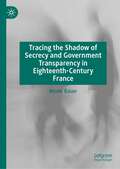Résultats de recherche de titre
Articles 1 à 2 sur 2

Found (Secrets of Crittenden County #03)
Par Shelley Shepard Gray. 2012
DAISY audio (CD), DAISY audio (Téléchargement direct), DAISY audio (Zip)
Christianisme (romans), Intrigue amoureuse, Famille (récits), Policiers (romans), Intrigue amoureuse contemporaine , Intrigue amoureuse à sensations, Littérature générale (romans), Oeuvres littéraires (romans), Sensations (romans à)Religion
Audio avec voix humaine
The hunt for Perry Borntrager's murderer continues. Perry's ex-friend Jacob explores a developing relationship with Perry's sister Deborah while the…
police question their movements on the day of the murder. Couples Walker and Lydia, and Luke and Frannie discover solutions as the Marion KY Amish and English find ways to share their lives and heal the community. Sequel to The Search (DBC 17572). 2012. Adult
Tracing the Shadow of Secrecy and Government Transparency in Eighteenth-Century France
Par Nicole Bauer. 2023
Braille (abrégé), Braille électronique (abrégé), DAISY Audio (CD), DAISY Audio (Téléchargement Direct), DAISY Audio (Zip), DAISY texte (Téléchargement direct), DAISY texte (Zip), Word (Zip), ePub (Zip)
Intrigue amoureuse à sensationsEurope (histoire), Histoire, Politique et gouvernement, Religion
Audio avec voix de synthèse, Braille automatisé
This book traces changing attitudes towards secrecy in eighteenth-century France, and explores the cultural origins of ideas surrounding government transparency.…
The idea of keeping secrets, both on the part of individuals and on the part of governments, came to be viewed with more suspicion as the century progressed. By the eve of the French Revolution, writers voicing concerns about corruption saw secrecy as part and parcel of despotism, and this shift went hand in hand with the rise of the idea of transparency. The author argues that the emphasis placed on government transparency, especially the mania for transparency that dominated the French Revolution, resulted from the surprising connections and confluence of changing attitudes towards honour, religious movements, rising nationalism, literature, and police practices. Exploring religious ideas that associated secrecy with darkness and wickedness, and proto-nationalist discourse that equated foreignness with secrecy, this book demonstrates how cultural shifts in eighteenth-century France influenced its politics. Covering the period of intense fear during the French Revolution and the paranoia of the Reign of Terror, the book highlights the complex interplay of culture and politics and provides insights into our attitudes towards secrecy today.